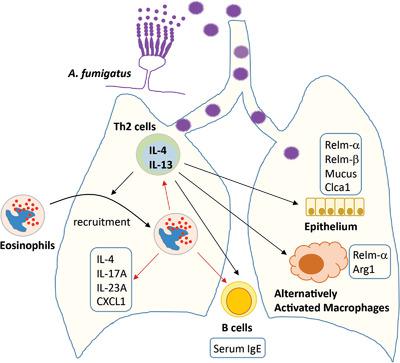当前位置:
X-MOL 学术
›
Eur. J. Immunol.
›
论文详情
Our official English website, www.x-mol.net, welcomes your
feedback! (Note: you will need to create a separate account there.)
Th2 cells promote eosinophil-independent pathology in a murine model of allergic bronchopulmonary aspergillosis.
European Journal of Immunology ( IF 4.5 ) Pub Date : 2020-02-28 , DOI: 10.1002/eji.201948411 Axel Dietschmann 1 , Sebastian Schruefer 2 , Sven Krappmann 2 , David Voehringer 1
European Journal of Immunology ( IF 4.5 ) Pub Date : 2020-02-28 , DOI: 10.1002/eji.201948411 Axel Dietschmann 1 , Sebastian Schruefer 2 , Sven Krappmann 2 , David Voehringer 1
Affiliation

|
Repeated inhalation of airborne conidia derived from the fungus Aspergillus fumigatus (Af ) can lead to a severe eosinophil‐dominated inflammatory condition of the lung termed allergic bronchopulmonary aspergillosis (ABPA). ABPA affects about 5 million individuals worldwide and the mechanisms regulating lung pathology in ABPA are poorly understood. Here, we used a mouse model of ABPA to investigate the role of eosinophils and T cell‐derived IL‐4/IL‐13 for induction of allergic lung inflammation. Selective deletion of IL‐4/IL‐13 in T cells blunted the Af‐induced lung eosinophilia and further resulted in lower expression of STAT6‐regulated chemokines and effector proteins such as Arginase 1, Relm‐α, Relm‐β, and Muc5a/c. Eosinophil‐deficient ΔdblGata mice showed lower IL‐4 expression in the lung and the number of Th2 cells in the lung parenchyma was reduced. However, expression of the goblet cell markers Clca1 and Muc5a/c, abundance of mucin‐positive cells, as well as weight gain of lungs were comparable between Af‐challenged ΔdblGata and WT mice. Based on these results, we conclude that T cell‐derived IL‐4/IL‐13 is essential for Af‐induced lung eosinophilia and inflammation while eosinophils may play a more subtle immunomodulatory role and should not simply be regarded as pro‐inflammatory effector cells in ABPA.
中文翻译:

Th2细胞在变应性支气管肺曲霉病的鼠模型中促进嗜酸性粒细胞非依赖性病理。
反复吸入源自烟曲霉(Af)的空气传播的分生孢子可导致严重的嗜酸性粒细胞为主的肺部炎症,称为变应性支气管肺曲霉病(ABPA)。ABPA影响全球约500万人,而对ABPA中调节肺部病理的机制了解甚少。在这里,我们使用ABPA小鼠模型研究了嗜酸性粒细胞和T细胞衍生的IL-4 / IL-13在诱导过敏性肺部炎症中的作用。T细胞中IL-4 / IL-13的选择性缺失使Af变钝诱发肺嗜酸性粒细胞增多,并进一步导致STAT6调节的趋化因子和效应蛋白(如精氨酸酶1,Relm-α,Relm-β和Muc5a / c)的表达降低。缺乏嗜酸性粒细胞的ΔdblGata小鼠肺中IL-4表达降低,肺实质中Th2细胞数量减少。但是,在Af挑战的ΔdblGata和野生型小鼠之间,杯状细胞标志物Clca1和Muc5a / c的表达,黏蛋白阳性细胞的丰度以及肺的增重是可比的。根据这些结果,我们得出结论,T细胞衍生的IL-4 / IL-13对于Af诱导的肺嗜酸性粒细胞增多和炎症至关重要,而嗜酸性粒细胞可能起更细微的免疫调节作用,不应简单地视为促炎性效应细胞在ABPA中。
更新日期:2020-02-28
中文翻译:

Th2细胞在变应性支气管肺曲霉病的鼠模型中促进嗜酸性粒细胞非依赖性病理。
反复吸入源自烟曲霉(Af)的空气传播的分生孢子可导致严重的嗜酸性粒细胞为主的肺部炎症,称为变应性支气管肺曲霉病(ABPA)。ABPA影响全球约500万人,而对ABPA中调节肺部病理的机制了解甚少。在这里,我们使用ABPA小鼠模型研究了嗜酸性粒细胞和T细胞衍生的IL-4 / IL-13在诱导过敏性肺部炎症中的作用。T细胞中IL-4 / IL-13的选择性缺失使Af变钝诱发肺嗜酸性粒细胞增多,并进一步导致STAT6调节的趋化因子和效应蛋白(如精氨酸酶1,Relm-α,Relm-β和Muc5a / c)的表达降低。缺乏嗜酸性粒细胞的ΔdblGata小鼠肺中IL-4表达降低,肺实质中Th2细胞数量减少。但是,在Af挑战的ΔdblGata和野生型小鼠之间,杯状细胞标志物Clca1和Muc5a / c的表达,黏蛋白阳性细胞的丰度以及肺的增重是可比的。根据这些结果,我们得出结论,T细胞衍生的IL-4 / IL-13对于Af诱导的肺嗜酸性粒细胞增多和炎症至关重要,而嗜酸性粒细胞可能起更细微的免疫调节作用,不应简单地视为促炎性效应细胞在ABPA中。









































 京公网安备 11010802027423号
京公网安备 11010802027423号